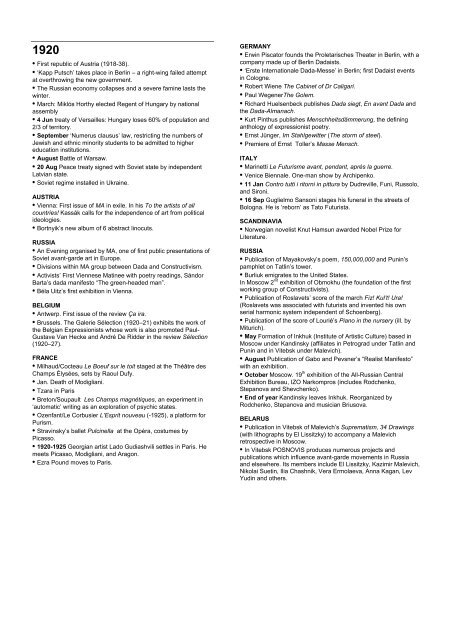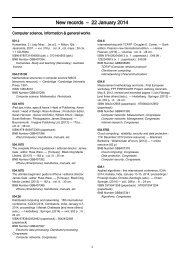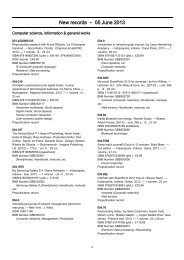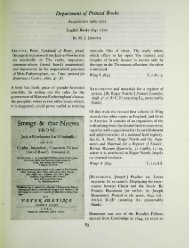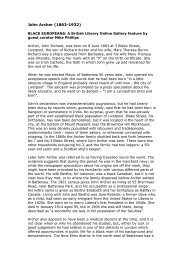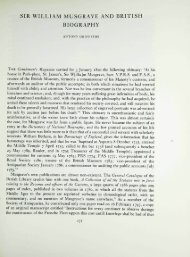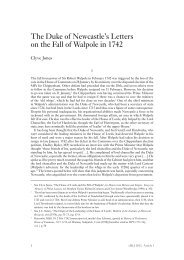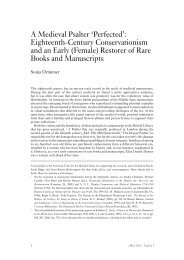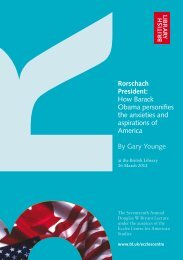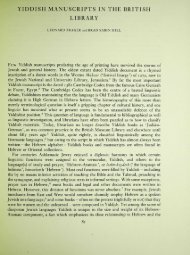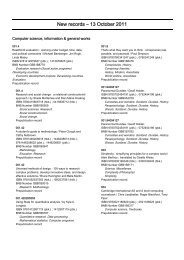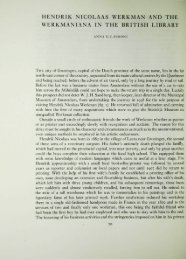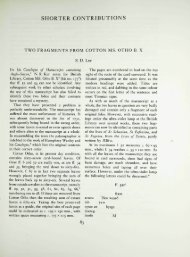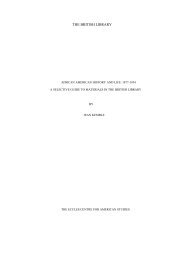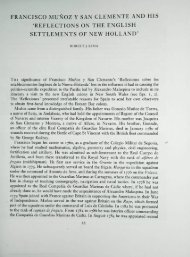Chronology of the European Avant Garde, 19001937 - British Library
Chronology of the European Avant Garde, 19001937 - British Library
Chronology of the European Avant Garde, 19001937 - British Library
You also want an ePaper? Increase the reach of your titles
YUMPU automatically turns print PDFs into web optimized ePapers that Google loves.
1920<br />
• First republic <strong>of</strong> Austria (1918-38).<br />
• ‘Kapp Putsch’ takes place in Berlin – a right-wing failed attempt<br />
at overthrowing <strong>the</strong> new government.<br />
• The Russian economy collapses and a severe famine lasts <strong>the</strong><br />
winter.<br />
• March: Miklós Horthy elected Regent <strong>of</strong> Hungary by national<br />
assembly<br />
• 4 Jun treaty <strong>of</strong> Versailles: Hungary loses 60% <strong>of</strong> population and<br />
2/3 <strong>of</strong> territory.<br />
• September ‘Numerus clausus’ law, restricting <strong>the</strong> numbers <strong>of</strong><br />
Jewish and ethnic minority students to be admitted to higher<br />
education institutions.<br />
• August Battle <strong>of</strong> Warsaw.<br />
• 20 Aug Peace treaty signed with Soviet state by independent<br />
Latvian state.<br />
• Soviet regime installed in Ukraine.<br />
AUSTRIA<br />
• Vienna: First issue <strong>of</strong> MA in exile. In his To <strong>the</strong> artists <strong>of</strong> all<br />
countries! Kassák calls for <strong>the</strong> independence <strong>of</strong> art from political<br />
ideologies.<br />
• Bortnyik’s new album <strong>of</strong> 6 abstract linocuts.<br />
RUSSIA<br />
• An Evening organised by MA, one <strong>of</strong> first public presentations <strong>of</strong><br />
Soviet avant-garde art in Europe.<br />
• Divisions within MA group between Dada and Constructivism.<br />
• Activists’ First Viennese Matinee with poetry readings, Sándor<br />
Barta’s dada manifesto “The green-headed man”.<br />
• Béla Uitz’s first exhibition in Vienna.<br />
BELGIUM<br />
• Antwerp. First issue <strong>of</strong> <strong>the</strong> review Ça ira.<br />
• Brussels. The Galerie Sélection (1920–21) exhibits <strong>the</strong> work <strong>of</strong><br />
<strong>the</strong> Belgian Expressionists whose work is also promoted Paul-<br />
Gustave Van Hecke and André De Ridder in <strong>the</strong> review Sélection<br />
(1920–27).<br />
FRANCE<br />
• Milhaud/Cocteau Le Boeuf sur le toit staged at <strong>the</strong> Théâtre des<br />
Champs Élysées, sets by Raoul Dufy.<br />
• Jan. Death <strong>of</strong> Modigliani.<br />
• Tzara in Paris<br />
• Breton/Soupault Les Champs magnétiques, an experiment in<br />
‘automatic’ writing as an exploration <strong>of</strong> psychic states.<br />
• Ozenfant/Le Corbusier L’Esprit nouveau (-1925), a platform for<br />
Purism.<br />
• Stravinsky’s ballet Pulcinella at <strong>the</strong> Opéra, costumes by<br />
Picasso.<br />
• 1920-1925 Georgian artist Lado Gudiashvili settles in Paris. He<br />
meets Picasso, Modigliani, and Aragon.<br />
• Ezra Pound moves to Paris.<br />
GERMANY<br />
• Erwin Piscator founds <strong>the</strong> Proletarisches Theater in Berlin, with a<br />
company made up <strong>of</strong> Berlin Dadaists.<br />
• ‘Erste Internationale Dada-Messe’ in Berlin; first Dadaist events<br />
in Cologne.<br />
• Robert Wiene The Cabinet <strong>of</strong> Dr Caligari.<br />
• Paul WegenerThe Golem.<br />
• Richard Huelsenbeck publishes Dada siegt, En avant Dada and<br />
<strong>the</strong> Dada-Almanach.<br />
• Kurt Pinthus publishes Menschheitsdämmerung, <strong>the</strong> defining<br />
anthology <strong>of</strong> expressionist poetry.<br />
• Ernst Jünger, Im Stahlgewitter (The storm <strong>of</strong> steel).<br />
• Premiere <strong>of</strong> Ernst Toller’s Masse Mensch.<br />
ITALY<br />
• Marinetti Le Futurisme avant, pendant, après la guerre.<br />
• Venice Biennale. One-man show by Archipenko.<br />
• 11 Jan Contro tutti i ritorni in pittura by Dudreville, Funi, Russolo,<br />
and Sironi.<br />
• 16 Sep Guglielmo Sansoni stages his funeral in <strong>the</strong> streets <strong>of</strong><br />
Bologna. He is ‘reborn’ as Tato Futurista.<br />
SCANDINAVIA<br />
• Norwegian novelist Knut Hamsun awarded Nobel Prize for<br />
Literature.<br />
RUSSIA<br />
• Publication <strong>of</strong> Mayakovsky’s poem, 150,000,000 and Punin’s<br />
pamphlet on Tatlin’s tower.<br />
• Burliuk emigrates to <strong>the</strong> United States.<br />
In Moscow 2 nd exhibition <strong>of</strong> Obmokhu (<strong>the</strong> foundation <strong>of</strong> <strong>the</strong> first<br />
working group <strong>of</strong> Constructivists).<br />
• Publication <strong>of</strong> Roslavets’ score <strong>of</strong> <strong>the</strong> march Fiz! Kul’t! Ura!<br />
(Roslavets was associated with futurists and invented his own<br />
serial harmonic system independent <strong>of</strong> Schoenberg).<br />
• Publication <strong>of</strong> <strong>the</strong> score <strong>of</strong> Lourié’s Piano in <strong>the</strong> nursery (ill. by<br />
Miturich).<br />
• May Formation <strong>of</strong> Inkhuk (Institute <strong>of</strong> Artistic Culture) based in<br />
Moscow under Kandinsky (affiliates in Petrograd under Tatlin and<br />
Punin and in Vitebsk under Malevich).<br />
• August Publication <strong>of</strong> Gabo and Pevsner’s “Realist Manifesto”<br />
with an exhibition.<br />
• October Moscow. 19 th exhibition <strong>of</strong> <strong>the</strong> All-Russian Central<br />
Exhibition Bureau, IZO Narkompros (includes Rodchenko,<br />
Stepanova and Shevchenko).<br />
• End <strong>of</strong> year Kandinsky leaves Inkhuk. Reorganized by<br />
Rodchenko, Stepanova and musician Briusova.<br />
BELARUS<br />
• Publication in Vitebsk <strong>of</strong> Malevich’s Suprematism, 34 Drawings<br />
(with lithographs by El Lissitzky) to accompany a Malevich<br />
retrospective in Moscow.<br />
• In Vitebsk POSNOVIS produces numerous projects and<br />
publications which influence avant-garde movements in Russia<br />
and elsewhere. Its members include El Lissitzky, Kazimir Malevich,<br />
Nikolai Suetin, Ilia Chashnik, Vera Ermolaeva, Anna Kagan, Lev<br />
Yudin and o<strong>the</strong>rs.


